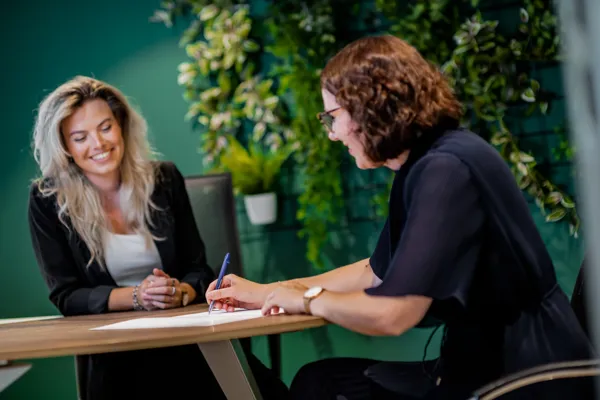Expat mortgages in the Netherlands
Are you currently (or planning to be) employed in the Netherlands and are you considering buying a house here? De Hypotheker can inform you about the possibilities and help you with the process of getting an expat mortgage. Use our online mortgage calculator for the Netherlands in the section below.

-
Over 40 years of experience
De Hypotheker is the oldest and largest independent mortgage broker in the Netherlands.
-
Tailored advice
We take a detailed look at your personal situation and financial record. This allows us to recommend the mortgage that best suits your needs and expectations.
-
All your financing needs under one roof
At De Hypotheker, you can not only get mortgage advice, but also other financial advice such as home insurance.
Expat mortgages
Buying a house in the Netherlands as an expat involves quite a lot of rules and regulations. Below, you will find a few things to consider.
Six months in the Netherlands
You have to work and live in the Netherlands in order to get a Dutch mortgage. Some banks require that you have lived here for at least six months. You can prove this by showing a payslip, employer's statement or residence permit.
A Dutch savings account
When you use (some of) your savings to finance the mortgage, this money needs to be on a Dutch bank account.
When you are not an EU citizen
When you are not from an EU country or from Liechtenstein, Norway or Iceland, you need to have a non-temporary residence permit in order to apply for a mortgage.
Book an appointment
Please feel free to book an appointment at one of our offices. The financial adviser will look at your situation, show you what the mortgage rates in the Netherlands are and tell you about all the next steps. The first appointment is free of charge. The six steps below describe the process of buying a house in the Netherlands.
1
Determine your budget
Determine your budget
Before you can start looking at houses, you need to determine your budget. Your maximum mortgage capacity depends, among other things, on your yearly income and any loans or debts. Besides your maximum capacity, you also need to consider what monthly costs you are comfortable with. With our online tool you can quickly calculate what the monthly costs are for the desired mortgage amount (the tool is in Dutch).
2
Looking for houses
Looking for houses
The website most widely used for finding houses in the Netherlands is Funda.nl. When you find a house that you like, you can make an appointment with the broker that is selling the property. You can also hire an estate agent to look for houses for you and help you with making a bid. Some agents work with a fixed price, others ask commission, usually between 1 and 2 percent of the purchase price.
3
Make a bid
Make a bid
Did you find your dreamhouse? Then it is time to make a bid. It is best to do this via e-mail, so you can put your terms down in writing. A common term is 'Voorbehoud van financiering'. This means that if the mortgage application falls through, you can still get out of the contract. It is common to receive a counter offer, so don't start out with bidding your maximum price. If your bid is accepted and you sign the contract, you still have three days in which you are allowed to change your mind. After these three days, you are legally bound to the contract.
4
Preparing your mortgage application
Preparing your mortgage application
Make an appointment with De Hypotheker, so we can start arranging your expat mortgage. In order to apply for the mortgage, we need several documents and infomation, such as your passport, residence permit, the purchase agreement, employer's statement, salary specification, etc. Your adviser will tell you exactly what documents he or she needs. You can upload the documents in our online environment.
5
Sign the mortgage offer
Sign the mortgage offer
After receiving all the required documents and information, your adviser will look for the best suitable mortgage for you. He will perform a mortgage comparison in the Netherlands and apply for the desired mortgage at the mortgage supplier. When the supplier approves your mortgage, you get a mortgage offer with the corresponding interest rate. Once you have signed this, you are almost done!
6
Becoming a home owner at the civil-law notary
Becoming a home owner at the civil-law notary
On the day of the transfer of the house you go to the notary. Here you sign the final purchase contract and the mortgage contract and receive the keys of the property. Congratulations, the house is yours!

Frequently asked questions
Buying a house in the Netherlands can be different than what your used to. Below you'll find answers to the questions we get asked the most.
What are the costs of the services of De Hypotheker?
If you visit De Hypotheker, your first appointment is always free of charge. During this intake interview we find out everything about your situation and advise you about the different steps necessary to realize your plans. If you decide to continue with our services, the adviser will inform you about the costs that come with it. You can expect the costs to be between € 2,900 and € 3,600, depending on your situation.
What are the tax rules in the Netherlands when it comes to buying a house?
A lot of the costs you are making when buying a house, such as the fee for your mortgage adviser, civil-law notary costs and valuation costs, are tax deductible. Next to that, there is the 'hypotheekrenteaftrek', which means that you deduct paid mortgage interest from your gross income, so that you ultimately pay less income tax. Under certain conditions, the interest you pay for your mortgage is tax deductible for a maximum of 30 years. Of course, these regulations only apply if you pay income tax in The Netherlands. Your adviser at De Hypotheker can help you with your tax returns.
What are the additional costs when buying a house?
Kosten koper (costs for the purchaser’s account), abbreviated k.k., are the costs that must be made to become the owner of a house. The buyers costs include transfer tax and civil-law notary fees. You also need to take into account costs for the estate agent, valuation costs and costs for mortgage advice. On average, you spend about six percent of the home value on additional costs. So, if you buy a house of € 300,000, the additional costs are approximately € 18,000.
Reviews
Our mortgage advisors have a lot of experience with expat mortgages. Here's what other expats' who chose De Hypotheker for their mortgage advice say about us.






